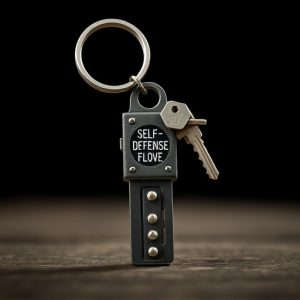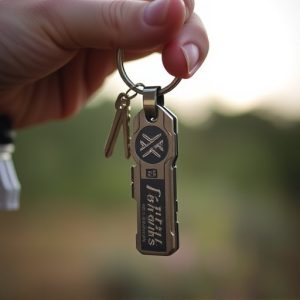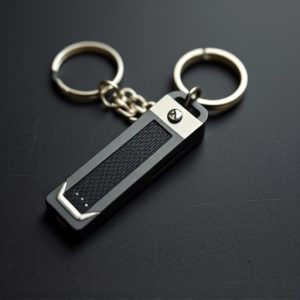Unbreakable Keychains for Legal Carry: A Comprehensive Guide to US States
Unbreakable self-defense keychains in the U.S. are subject to varying state laws, with regulations o…….
Unbreakable self-defense keychains in the U.S. are subject to varying state laws, with regulations on size, material, and intended use. While some states allow open carry, others have strict restrictions. Keychains made from durable materials like stainless steel or titanium are reliable options, offering sharp blades for cutting and advanced grips for easy one-handed use. Understanding local laws is crucial for legal carrying and personal safety, balancing the need for protection with adherence to state definitions of legal self-defense tools.
In today’s world, personal safety is paramount, leading many to explore compact self-defense solutions. One such innovative device gaining traction is the protective keyring, offering both convenience and a sense of security. This article delves into the legalities surrounding these devices in the US, examining state-specific regulations and the factors that contribute to their durability and effectiveness. We’ll also showcase top choices for those seeking legal carry options, highlighting unbreakable materials that ensure peace of mind while navigating diverse environments.
- Understanding the Legalities of Self-Defense Keychain Devices in the US
- Unbreakable Materials: What Makes a Keychain Truly Durable and Safe?
- Top Choices for Legal Carry States: Exploring Popular Self-Defense Keychains
- State-Specific Regulations: A Deep Dive into Carrying Laws Across Different Regions
- Benefits and Limitations: Weighing the Pros and Cons of Carrying a Self-Defense Keychain
Understanding the Legalities of Self-Defense Keychain Devices in the US
In the United States, the legal status of self-defense keychain devices is a complex matter that varies from state to state. These unbreakable self-defense keychains are designed to offer individuals quick and accessible protection in potential dangerous situations. However, their legality hinges on factors such as size, material, and intended use. Some states explicitly allow the open carry of self-defense tools, including keychains equipped with sharp edges or spikes, while others have stricter regulations, requiring permits or restricting certain types of weapons.
States like Texas and Florida are known for their more lenient self-defense laws, permitting citizens to carry defensive devices without a permit. Conversely, states like California and New York have stringent restrictions on the type and size of allowed self-defense tools. Keychain devices made from unbreakable materials like high-strength steel or ceramic are generally legal in many areas but must comply with local regulations regarding blade length, locking mechanisms, and overall design. Understanding these legal nuances is crucial for ensuring compliance and peace of mind when considering an unbreakable self-defense keychain as a personal safety measure.
Unbreakable Materials: What Makes a Keychain Truly Durable and Safe?
When it comes to unbreakable materials for self-defense keychains, durability and reliability are paramount. Look for keyrings crafted from high-quality, robust metals like stainless steel or titanium. These materials boast exceptional strength and resistance against bending, breaking, or deforming, ensuring your keychain remains functional even in the toughest situations.
Additionally, certain advanced composite materials are now available, offering unparalleled durability combined with lightweight properties. These innovative designs incorporate elements such as carbon fiber or aramid fibers, which significantly enhance the overall strength-to-weight ratio of the keychain. Such materials can withstand extreme impacts and stresses, making them ideal choices for those seeking a reliable self-defense tool that won’t let them down when it matters most.
Top Choices for Legal Carry States: Exploring Popular Self-Defense Keychains
When considering self-defense keychains for legal carry states, it’s crucial to choose products made from unbreakable materials. Options like titanium and high-strength steel are popular for their durability and resistance to breaking or bending, even under extreme pressure. These materials ensure that your self-defense tool remains functional when you need it most.
Popular designs often incorporate sharp blades or spikes, offering both a cutting edge for emergency situations and a deterrent effect. Some models also feature advanced features such as tactical grip patterns, one-handed opening mechanisms, and built-in flashlights, enhancing their versatility in various scenarios. The best legal carry states options prioritize user safety and convenience while adhering to local regulations regarding self-defense weapons.
State-Specific Regulations: A Deep Dive into Carrying Laws Across Different Regions
The legal landscape surrounding self-defense tools, including unbreakable keychain materials, varies significantly from state to state in the US. What may be permitted in one region could be heavily restricted or even illegal in another. For example, some states allow for open carry of self-defense devices like keychains while others require them to be concealed, and certain jurisdictions have specific requirements regarding the type of material, size, and functionality of such tools.
Navigating these state-specific regulations is crucial for individuals seeking to legally carry an unbreakable keychain for self-defense purposes. Each state has its own set of rules and definitions regarding what constitutes a legal self-defense tool, so understanding local laws before carrying any device is essential. This deep dive into carrying laws across different regions empowers citizens to make informed decisions about their personal safety while adhering to the law.
Benefits and Limitations: Weighing the Pros and Cons of Carrying a Self-Defense Keychain
Carrying a self-defense keychain can offer several benefits, especially in potentially dangerous situations. These small, often discreet devices provide an easy and readily available means of protection. Made from unbreakable materials like high-quality steel or aluminum, they can serve as a deterrent against potential threats, giving users the confidence to navigate unfamiliar surroundings. Their compact size makes them convenient for everyday carry, ensuring individuals are prepared should they encounter a risky scenario.
However, there are limitations to consider. While these keychains may provide a sense of security, they are not designed for extended self-defense or as a primary weapon. The effectiveness of such tools relies on the user’s ability to deploy them quickly and accurately in a high-stress situation, which can be challenging for some individuals. Additionally, legal carry regulations vary across states, so users must familiarize themselves with local laws to avoid any legal repercussions when carrying self-defense tools like these keychains.
When considering an unbreakable self-defense keychain, understanding your state’s regulations is key. While these devices offer enhanced safety and peace of mind, their legality varies across the US. By reviewing state-specific rules and evaluating the benefits and limitations, you can make an informed decision about whether a self-defense keychain is a suitable choice for your needs. Always ensure you prioritize safety while adhering to local laws, as these devices can be powerful tools when used responsibly.


